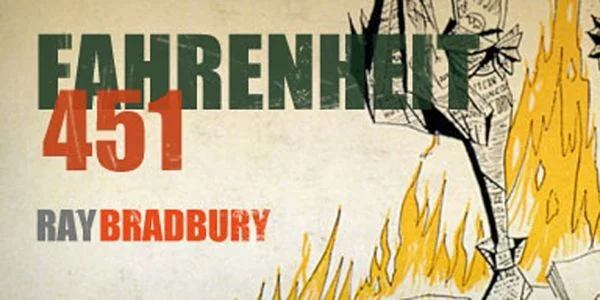In Fahrenheit 451, Ray Bradbury presents a dystopian world where books are outlawed, independent thought is suppressed, and the firemen’s job is to destroy knowledge rather than preserve it.
Guy Montag, the novel’s protagonist, starts as a loyal fireman but undergoes a profound transformation as he begins to question the world around him.
One of the most pivotal moments in his journey is when he burns a book of poetry in the wall incinerator in his home—seemingly contradicting his growing curiosity about literature. But why does he do it?
The Scene in Context: A Moment of Tension
The incident occurs in Part Two of the novel, “The Sieve and the Sand.” Montag has secretly collected books and begun to read them, drawn by a deepening sense of emptiness in his life and a desire for authentic meaning. He’s begun to question not only the anti-book laws but the hollow existence that society has constructed in their place.
In a moment of rebellion and confusion, Montag brings out a book of poetry—Dover Beach by Matthew Arnold—and reads it aloud to a group of his wife’s friends. The women are emblematic of the numbed citizenry Bradbury critiques: shallow, easily offended, and incapable of sustained emotional engagement. One of the women, Mrs. Phelps, breaks down crying, stirred by the poem’s emotional resonance. The others, uncomfortable and angry, accuse Montag of being cruel.
Soon after, Montag burns the book in the wall incinerator.
This action, though brief, carries enormous symbolic and psychological weight. It appears to run counter to Montag’s development—so why does he do it?
Montag’s Internal Conflict: Fear Versus Awakening
To understand Montag’s decision, it’s essential to recognize the psychological pressure he is under. Montag is not yet free from the influence of the authoritarian world he lives in. He is caught between two identities: the obedient fireman who upholds society’s laws and the awakened seeker of truth who finds value in literature. At the time of this scene, he is in a fragile, liminal state.
Burning the book is, in part, a defensive gesture. By destroying it in front of his wife and her friends, Montag momentarily attempts to preserve his safety and conceal the extent of his rebellion. He senses the danger of revealing too much too soon. In a world where neighbors report each other for unorthodox behavior, public sympathy for books could be a death sentence.
Therefore, the burning functions as a social mask—a last-minute performance to avoid suspicion. It’s a desperate attempt to blend back in, to undo what cannot be undone: the emotional impact the poem had on the women, and the dangerous line he crossed by reading it aloud.
The Power of Literature: Emotional Exposure and Panic
Montag’s decision is also a response to the raw power of the poetry itself. Dover Beach is a melancholic meditation on lost faith, uncertainty, and the need for true connection—ideas that sharply contrast with the superficiality of Montag’s world. The poem unsettles Mrs. Phelps and momentarily forces her to confront feelings she has long buried under entertainment and numbness.
Montag is shocked by the power of the poem. It’s a moment of unintended consequence. He realizes literature can not only inspire but destabilize. The book, though just a few pages long, triggers an emotional response that threatens to upend the comfortable illusion of societal order. Montag may not yet be prepared to handle the ramifications of that awakening.
His destruction of the book, then, becomes an act of emotional panic. In a sense, he is trying to put the genie back in the bottle—to undo the damage, both to the women and to himself.
Mildred’s Role: Surveillance Within the Home
Montag’s wife, Mildred, plays a critical role in the scene. She is deeply embedded in the state’s ideology and is fearful of anything that disrupts the status quo. Her loyalty to the television “family” and her horror at Montag’s growing interest in books make her both a symbolic and literal threat.
Before Montag reads the poem, Mildred tries to cover for him by explaining to her friends that firemen are allowed to bring one book home a year as a joke. Her panic mirrors Montag’s own: both are terrified of being caught. Once the reading goes wrong, Mildred’s disapproval adds further pressure on Montag to destroy the book. Her presence, and the risk of her betrayal, adds another layer of urgency.
The incinerator burning becomes a signal—a performance of loyalty aimed as much at Mildred as it is at the guests.
The Wall Incinerator: A Symbol of Internalized Censorship
It’s no coincidence that Montag uses the wall incinerator inside his own home. This is not a public spectacle; it’s a private ritual. The very existence of such an appliance normalizes destruction. It symbolizes how deeply censorship has been embedded into daily life—so much so that people willingly participate in their own oppression.
Montag’s use of the wall incinerator underscores that he is still partially complicit in the world he wants to escape. His rebellion is not complete, and the comfort of old habits has not fully left him. He acts not out of conviction, but confusion—a man pulled in two directions.
A Turning Point, Not a Regression
Despite appearing like a step backward, the burning of the poetry book is actually a crucial turning point in Montag’s character arc. It is a moment of crisis, not surrender. He recognizes that his attempt to introduce literature into a hostile environment has failed. He also realizes that fear still governs his choices—but that realization itself is the beginning of transformation.
From this point onward, Montag becomes more decisive. His actions become bolder, his thinking clearer. The failure of the poetry reading shows him that awakening others is not as simple as sharing a book. It requires courage, strategy, and a willingness to confront not just society’s lies but its emotional consequences.
A Necessary Moment of Tension
Montag burns the book of poetry not because he has rejected its value, but because he is overwhelmed by the weight of what that value means. In a society built on distraction, denial, and suppression, even a single poem is enough to unravel the illusion. Montag’s incineration of the book is a moment of regression born from fear, but it is also a catalyst. It exposes the power of literature, the fragility of conformity, and the emotional toll of waking up.
In Fahrenheit 451, the act of burning is not always final—it can also be a spark. And in Montag’s case, it lights the path toward the rebellion to come.



